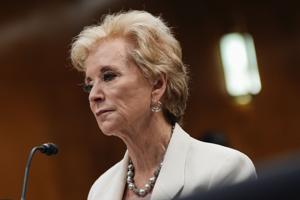WASHINGTON (AP) — A funding freeze by the Trump administration is sending ripples of concern through schools and day camp providers across the United States. The administration’s decision to withhold over $6 billion in federal grants, crucial for after-school and summer programs, has left many low-income families and educational institutions in a state of uncertainty.
The freeze, which affects grants for English language instruction, adult literacy, and more, is part of a broader review to ensure alignment with President Donald Trump’s priorities. This move has left states and schools scrambling to budget for the upcoming summer and school year, raising fears about the future of these programs.
Impact on Low-Income Families and Educational Programs
The funding freeze poses a significant threat to after-school care and summer activities for low-income children. Schools have warned that without these funds, they will be unable to offer affordable child care options, leaving parents without crucial support. The Boys and Girls Clubs of America, which relies on these grants, may have to halt their summer programs mid-season if funding is not restored soon.
Jim Clark, President of the Boys and Girls Clubs, expressed concern over the potential closures of 926 clubs nationwide, which would impact over 220,000 children. “If these funds are blocked, the fallout will be swift and devastating,” Clark stated.
Political and Legal Tensions
The funding freeze has sparked a political clash, with Democrats accusing the administration of bypassing congressional intent. Senator Patty Murray, a Democrat from Washington, criticized the administration for holding up funds that Congress had appropriated. “Every day that this funding is held up is a day that school districts are forced to worry about whether they’ll have to cut back on afterschool programs or lay off teachers,” Murray said in a statement.
Meanwhile, the Education Department has remained firm, stating that the review is necessary to ensure taxpayer resources align with the President’s priorities. The timeline for the release of funds remains uncertain, adding to the anxiety of school districts nationwide.
Specific Programs and Potential Consequences
The grants under review include the 21st Century Community Learning Centers, the primary federal funding source for after-school and summer learning programs. This program alone supports over 10,000 local initiatives across the country. Other affected grants include $2 billion for teachers’ professional development, $1 billion for academic enrichment, and $890 million for English language learners.
“Trump is illegally impounding billions of dollars appropriated by Congress to serve students this fiscal year,” said Tony Thurmond, California’s state superintendent.
States like California and Texas are particularly affected, with hundreds of thousands of dollars in limbo. The Learning Policy Institute noted that these programs account for over 20% of the federal funds received by the District of Columbia for K-12 education.
Local Impacts and Broader Implications
In Gadsden City Schools, Alabama, officials warned that their after-school program serving over 1,200 low-income students would be forced to close without federal funds. Janie Browning, who directs the program, emphasized the critical role these programs play in keeping children safe and engaged while parents work.
Jodi Grant, executive director of the Afterschool Alliance, highlighted the potential economic repercussions, stating that the withholding of funds could cause lasting damage. Some advocates fear the grants are being targeted for elimination, a move that could force schools to cut programs and jobs.
Rural and Migrant Communities at Risk
Rural districts, like Umatilla School District in Oregon, face unique challenges due to their reliance on federal funding. Superintendent Heidi Sipe is preparing for potential layoffs and program cuts if the freeze continues. “It’s an essential service in our community because we don’t have any licensed child care centers for school-age children,” Sipe said.
The situation is particularly dire for districts with large populations of English learners and migrant families. These communities depend heavily on federal support for educational and engagement programs.
Looking Ahead
The Trump administration’s funding freeze has set the stage for a significant policy debate over the future of educational grants. As schools and communities await clarity, the potential impacts on children, families, and educators loom large. The outcome of this funding review will have lasting implications for the accessibility and quality of after-school and summer programs across the nation.
As the situation develops, stakeholders continue to advocate for the release of funds, emphasizing the critical role these programs play in supporting vulnerable populations and enhancing educational outcomes.
